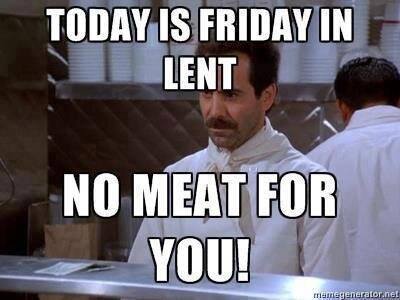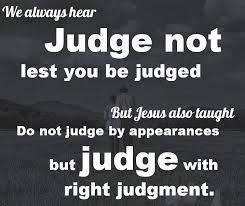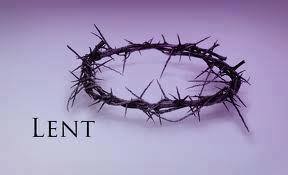
Monthly Archives: February 2018
It’s Friday – No Meat Today

Remember, it’s Friday – No Meat Today! ![]()
Fridays during Lent are obligatory days of abstinence. Abstinence refers to the avoidance of certain foods. The most common form of abstinence is the avoidance of meat, a spiritual practice that goes back to the earliest days of the Church.
Catholics over the age of 14 are required to abstain from meat and from foods made with meat in honor of the Passion of Jesus on Good Friday.
According to the USCCB, “abstinence laws consider that meat comes only from animals such as chicken, cows, sheep or pigs – all of which live on land. Birds are also considered meat. Abstinence does not include meat juices and liquid foods made from meat. Thus, such foods as chicken broth, consomme, soups cooked or flavored with meat, meat gravies or sauces, as well as seasonings or condiments made from animal fat are technically not forbidden. However, moral theologians have traditionally taught that we should abstain from all animal-derived products (except foods such as gelatin, butter, cheese and eggs, which do not have any meat taste). Fish are a different category of animal. Salt and freshwater species of fish, amphibians, reptiles (cold-blooded animals) and shellfish are permitted.”
Many Catholics do not realize that the Church still recommends abstinence on all Fridays of the year, not just during Lent. In fact, if we don’t abstain from meat on non-Lenten Fridays, we’re required to substitute some other form of penance.
Wishing you all a very holy Lent!
Judging

“Judge not, that you be not judged. For with the judgment you pronounce you will be judged, and the measure you give will be the measure you get. Why do you see the speck that is in your brother’s eye, but do not notice the log that is in your own eye? Or how can you say to your brother, “Let me take the speck out of your eye,” when there is the log in your own eye? You hypocrite, first take the log out of your own eye, and then you will see clearly to take the speck out of your brother’s eye.” (Matt. 7:1-5)
To “judge” as it is used here does not mean that people cannot discern that an act is sinful, nor does it mean we can’t tell the sinner that he or she is sinning. If that were so, then parents could not ever tell their child that it is wrong to lie, to cheat, or to steal. And if the child were caught in the act, then no parent could tell him or her that they were wrong. And they could certainly not ever punish the child, because there could never be any wrongdoing. Carried to its logical conclusion, no one could ever tell anyone that anything is sinful or wrong, including adultery, stealing, murder, taking the Lord’s name in vain, etc. . . And we would have to fire every judge in every courtroom worldwide.
If you read this whole passage, it becomes clear that Jesus was not telling his disciples that they could not ever judge the behavior of others. Rather, he was cautioning them to live righteous lives themselves so that their judgment of others’ behavior would not be rash judgment and their efforts would be effective in admonishing their neighbors.
Jesus indeed expects his disciples to judge but he warns that they, too, will be judged in a like manner. The idea of rightly judging the behavior of others can be found throughout the New Testament: Jesus told the Jews, “Do not judge by appearances, but judge with right judgment” (John 7:24).
Having said all that, there is a big difference between judging another’s behavior and judging the eternal state of his soul. The latter judgment belongs only to God.
So, when faced with the immoral behavior of loved ones, how can we be sure to rightly judge behavior? In Jesus’ own words, we must start by taking the logs out of our own eyes by making sure we are doing the best we can to live lives of good example. We must also strive to form our consciences correctly so that we know sin when we see it.
Finally, we must not jump to conclusions about another’s culpability in sin. Doing all this will help to ensure that our admonitions are seen as the loving actions we intend them to be — meant to help our loved ones live their lives in ways that are pleasing to God. Only then can our efforts be effective in helping to take these ugly specks out of our brothers’ eyes.
God loves the sinner, but hates the sin. All sin. Remember – it was all of our sin – present, past and future, that put Jesus on the cross. The sin you are doing today is another lash, another scourging, another nail in His body.
Yes – Jesus loves us and forgives us when we are truly sorry and asks for forgiveness in Confession, but he also said – “Go and sin no more.”
Lent begins.

Beautiful Prayer

